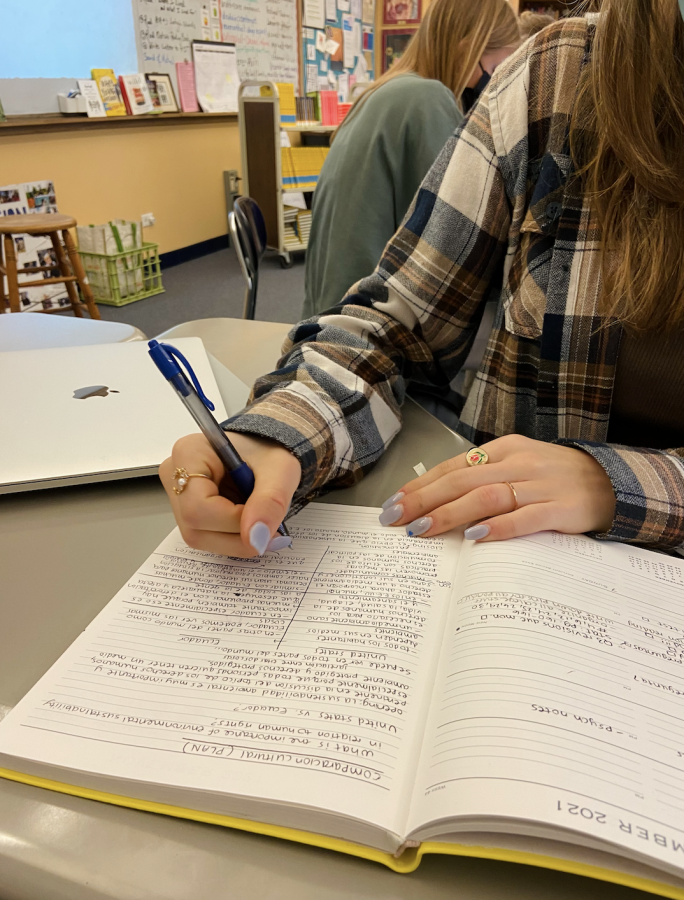The Power of Writing Things Down
Sarah Snow Writing in her Agenda
December 7, 2021
Today’s world places so much emphasis on the use technology, especially for students and teachers. From taking notes, to keeping schedules, to studying, there is so much pressure to do everything with a computer. Although this practice is great for convenience and can offer a person so much in terms of communication and outreach, it has been proven that all people retain information better when they physically write it down. Everyone should consider engaging in a more pen-to-paper approach to organizing and collecting thoughts, as the benefits of this lifestyle are endless.
Physical notation is truly such a powerful practice, particularly for note-taking. It comes down to the science of it all—humans store the information in a different part of their brain when they are physically writing, as opposed to when they are typing. This specific part of the brain is much more easily accessed and understood. The reality of this truth is easy to prove in any person, one of them being SHS Spanish Teacher Sarah Brady. She remarked, “I always thoroughly enjoyed taking handwritten notes. In college, I always chose to handwrite my notes because it helped me to stay better focused in class, and I felt that it helped me to retain the material better overall.” Brady’s connection to the practice is a perfect representation of the positive impact that physical notation has on a person, and all people should work toward it in the same way, prioritizing writing things down.
In addition to increasing memory, writing things down also invites more freedom and individuality in taking notes compared to typing. Brady sums this up wonderfully, stating, “Writing things down gives more flexibility in terms of how you organize your thoughts, especially when you are writing down class notes or ideas from a lecture.” Physical notation allows note-taking to be so much more personal. SHS senior Clara Sullivan can attest to this, as she too elects to write out her notes in class. Sullivan explains, “More often, I hand-write my notes because I think I remember things better and organize it all better that way.” Some like to play around with different pen colors or experiment with new formats. Others keep with the same technique every time. No matter the specific approach, hand-written notes are entirely tailored to the individual, enabling that person to get more out of the practice in general.
Prioritizing writing things down as a part of one’s daily routine certainly allows a person to be more productive and successful, but choosing it over a computer, phone or tablet, is also just better for a person overall. Sharon High School senior Chloe Nguyen always chooses to take notes and to journal by hand, for one reason in particular. Nguyen comments, “I find that I always write more when I type, so I will so often gravitate toward the hand-written option because I write less, condensing my thoughts and leaving me with less information to have to remember.” It’s simple: when there is less content to memorize, it is easier to retain.
Nguyen also went on to discuss how prevalent journaling has been in her life. Journaling is a great way to easily incorporate more physical notation into one’s life–especially if they want to stick with their computer for note-taking.
The benefits of this way of life also come down to its ability to pull you away from technology for a time. At school and in work life, it seems almost possible to escape, and at home, people are always on their phones or watching TV. Actively choosing to write things down instead of resorting to devices for convenience is the best option, as it is the healthier choice.
Routinely writing things down is a valuable and productive life practice. Not to mention how much more gratifying and fun it can be to organize one’s own thoughts! Though it may be a seemingly unimportant and simple idea, implementing physical notation into one’s daily routine will bring everlasting benefits.
Hopefully, readers of this article will use this information to reflect on how much they physically write in a day and use this new knowledge to work toward increasing the practice, as it truly leads to a healthier, happier, and more fulfilling life.
